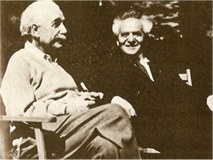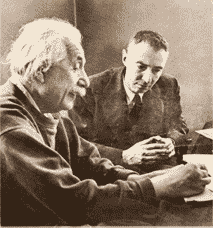Politics
Texts by Dr. Antonio Moreno González
Although Albert Einstein devoted much of his time to the defence of democracy, freedom and justice whenever an opportunity arose, he was never tempted to align himself with any party (though he declared himself to hold common cause with socialism) nor was he interested in accepting political office, or indeed any type of public post, including academic ones.
On the death of the first president of Israel, Chaim Weizmann, in 1952, Prime Minister David Ben Gurion, with the mediation of the Israeli ambassador in the United States, offered Einstein the vacant post. Einstein was categorical in his reply: "I know a little about nature, but hardly anything about men". Word of the proposal had spread, and as a result the area surrounding his family home was invaded by reporters. Einstein took the opportunity of his conversation with the ambassador to ask him to see that "the journalists lift the siege they have placed my house under". Certainly, he was not the right person to hold political office, nor to discuss with the press the vague remarks he said filled the pages of the newspapers.
He defended socialism as an alternative to the competitiveness and individualism inherent to capitalism, which could only be combated through a socialist economy that was more equitable in terms of the ownership of goods and performance of work--difficult to guarantee for all in a capitalist society. As always, the means he proposed for achieving those ideals was education and the decentralisation of political power, a measure which was lacking in Soviet socialism and ultimately led to its downfall, excessive bureaucracy and a concentration of power degenerating into a police state. His ideal political figure was no common leader, but Gandhi. Following Gandhi moral's lead, he fought against American McCarthyism which he equated with the Nazi persecution of Jews, Gypsies and homosexuals. Notoriously, Julius Robert Oppenheimer suffered abuse and infamy for refusing to continue to be involved in the nuclear arms race, having previously directed the Manhattan project which produced the first atom bombs.
Einstein's independence and rebellious spirit earned him the rejection of Germany, which accused the physicist of being a "Bolshevik" when he was first attacked for being a Jew, and caution from Russia, anyone working on the concept of relativity--which did not have Stalin's approval-- were persecuted.
Amongst he political ideals, he believed that at some point a world government and a united Europe might be possible. In 1922 he was made a member of the League of Nations' Committee on Intellectual Cooperation. He resigned in 1923, but was left with the disillusionment that gradually consumed his best ideals. At times, his words and his deeds seemed to contradict each other.
After World War II, Einstein, together with other scientists, many of whom had worked on the Manhattan project (possibly seeking to escape that horrendous shadow), created the Emergency Committee of Atomic Scientists (ECAS) to warn the public against the possible excesses by politicians in the use of nuclear power. Its essential missions were:
- To promote the peaceful use of nuclear energy for the benefit of mankind.
- To promote knowledge and information of nuclear energy [...] so that informed citizens can take intelligent decisions in their own benefit and that of all mankind.
It was an antecedent of the Einstein-Russell Manifesto of 1955, dealt with in greater detail below in the section on Einstein and the pacifist movements.

With David Ben Gurion (1886 - 1973)

The North American magazine, The Christian Science Monitor (August, 1960), published the faked photo in which J.R. Oppenheimer (1904 - 1967) "has disappeared". Yet another example of the insidious and vexatious persecution which Senator Joseph MacCarthy subjected many, under the pretext of the slogan: "Scratch an intellectual and you will find a communist". Einstein was a subject of monitoring by J. Edgar Hoover's FBI, to which, in some way, depended the MacCarthyite campaign
